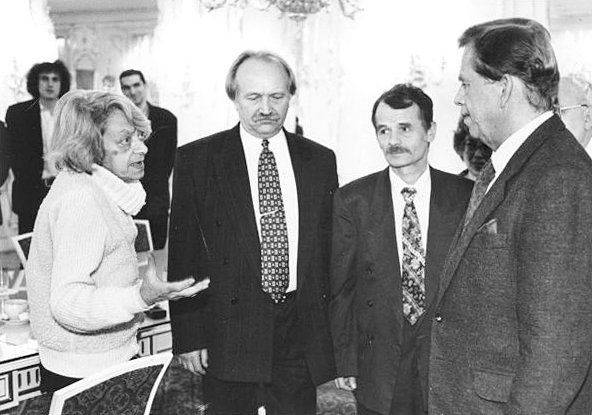Today marks the 90th anniversary of the birth of Larisa Iosifovna Bogoraz.

She was one of the people closest to me. Our friendship was an inheritance from my mother, Marlena Rakhlina, who studied with Lara in the philology department of Kharkiv University from 1944–1949. They had a wonderful group of friends—Boris Chichibabin, Yuly Daniel, Mark Eisenstadt, Iosif Goldenberg, Vladimir Portnov... My mother described these years in her novel in verse, Filfak. “Writing about youth is so sweet...”
Larisa was a woman of rare charm and nobility, qualities that simply radiated from her face. Throughout her life, she performed acts that seemed heroic to others but, for her, were as natural as breathing. As soon as she turned 18, she went to visit her father, who was in exile, despite her mother’s protests, tears, and pleas—to get to know him all over again: when he was arrested, she had been just a little girl.
After graduating from the university, she moved to Moscow, having married Yuly Daniel. In March 1951, their first child, Sanya Daniel, was born.
From 1961 to 1964, she was a graduate student in the department of mathematical and structural linguistics at the Institute of the Russian Language of the USSR Academy of Sciences, working in the field of phonology. In 1964–1965, she lived in Novosibirsk, where she taught general linguistics in the philology department of Novosibirsk University. In 1965, she defended her PhD dissertation.
She was a pioneer in many of her actions. In 1965, having returned to Moscow immediately after Daniel’s arrest, she organized what was effectively the first public campaign in the USSR regarding the arrest and trial of Andrei Sinyavsky and Yuly Daniel. This campaign marked the beginning of the human rights movement in the USSR. In early 1968, together with Pavel Litvinov, she made the first public appeal to the international community concerning the gross violations of legality during the trial of Alexander Ginzburg and his comrades (the so-called “Trial of the Four”). On August 25, 1968, she went to Lobnoye Mesto in the Kremlin along with seven other human rights activists to protest the invasion of Czechoslovakia. She was sentenced to four years of exile, which she served in Chuna, Irkutsk Oblast.
In 1966–1967, Larisa helped Anatoly Marchenko with his book about the camps and prisons of the 1960s—My Testimony. In 1971, Anatoly became Lara’s husband, and they settled in Tarusa. In 1973, she gave birth to her second son, Pavel Marchenko. Their life unfolded against a backdrop of constant KGB persecution, wiretaps, and surveillance... In 1975, Tolya was arrested and sentenced to four years of exile. In March 1981 came his sixth and final arrest: Tolya died after a long hunger strike in Chistopol Prison on December 8, 1986.
The road to the political camps in Mordovia and Perm Oblast ran through Moscow. Countless relatives of political prisoners stayed in Larisa’s hospitable apartment on Leninsky Prospekt on their way to and from prison visits. And political prisoners, upon their release from the camps, found their first shelter there. Many Ukrainian Sixtiers and their relatives passed through her apartment. Lara was friends with several Ukrainian prisoners of conscience and wrote to them regularly in the camps—in Ukrainian, of course. Her relationship with Ivan Svitlychnyi and his wife Lelya was particularly close. The families had become friends back in the late 1950s, when Yuly Daniel was translating the works of Ukrainian poets into Russian. Lara translated many Ukrainian samizdat documents into Russian before they were sent to the West. Later, it was she who, after a visit with Anatoly Marchenko, smuggled out information about a hiding place where issues of the Ukrainian Herald—prepared by Stepan Khmara, Oles Shevchenko, and Vitaliy Shevchenko—were concealed. She then traveled to Lviv and passed the information to Olena Antoniv.
p>In 1989, Lara became a co-chair of the re-established Moscow Helsinki Group. From 1991 to 1996, she conducted a series of educational seminars for human rights defenders from Russia and other countries of the former USSR. Those seminars truly enlightened many...From 1996 to 2001, Lara served as an external evaluator for the Kharkiv Human Rights Protection Group. She received and read the KHRG’s bulletin, Prava Lyudyny, came to our conferences, and met with our staff. We constantly and gratefully felt her active involvement. Her help and her advice were simply invaluable!
Lara was very attached to Ukraine, especially to her native Kharkiv. Wherever she went, she compared every city to Kharkiv! We walked with her to all the places that held memories for her—the houses where she had lived, the schools she had attended, and various university buildings. She even wanted to obtain Ukrainian citizenship but was forced to abandon the idea when she learned that she would have to renounce her Russian citizenship.
Lara wrote a wonderful memoir, Dreams of Memory. I highly recommend it!
She has been gone from this world for more than 15 years now. But it feels as if she is invisibly present, seeing everything, knowing everything. And I constantly wonder—what would she have said about this or that, how would she have acted?
Here is what my mother wrote the day after her death.
Всех умнее, всех живей,
всех милей, смелей…
Разве плохо было ей
с нами на Земле?
Ах, Лариса, мой дружок!
Кто ж тебя украл?
Для чего тебе рожок
зорю проиграл?
Но не вся же ты ушла!
С нами, живы, есть
твои славные дела,
благородство, честь!
И вовеки не умрет
вихрь твоих примет,
твой стремительный полет –
вечности привет.
April 7, 2004
Today, the whole family will gather near Vilnius at Pavel Marchenko’s home—children, grandchildren, and great-grandchildren. Sanka, Pasha, and everyone else—I wanted to come, but I couldn’t! I am with you in spirit!


















